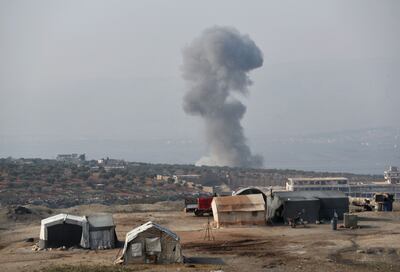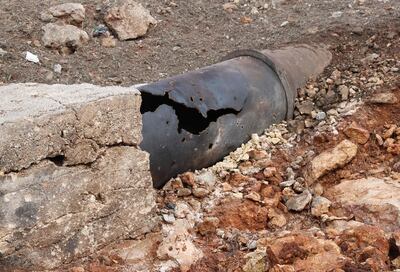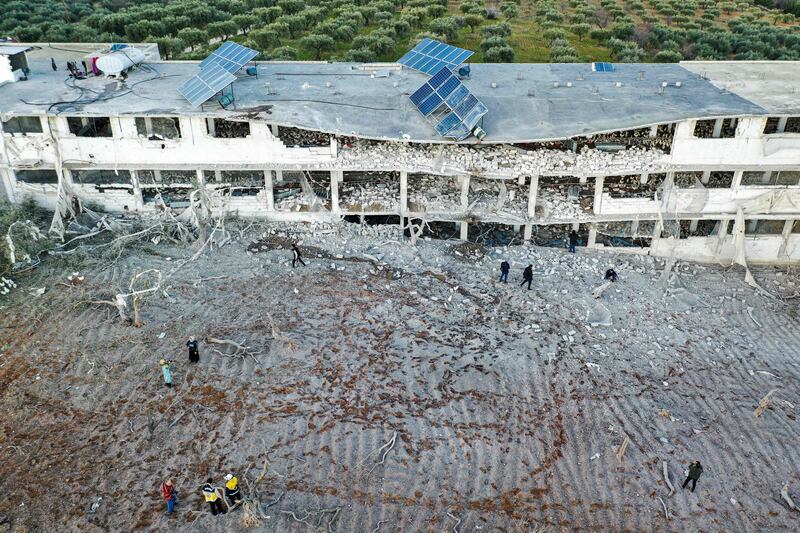Air strikes that destroyed farms and severely damaged a water plant near Idlib city in Syria have hurt the north-western region’s fragile economy, residents have told The National.
They worry the loss of livestock and poultry farms will endanger the food supply.
A major water plant serving the overcrowded Idlib city – which is now home to more than a million people – was put out of action in the strikes earlier this week.
Syrian opposition sources said Russian aircraft deliberately hit civilian infrastructure in the opposition-held region.
Idlib farmers say the attacks have been going on for weeks.
Russia has not commented on the wave of strikes but has previously denied targeting civilians and said that it carries out counter-terror operations.
‘Significant losses’
Deep Al Omar, the owner of a poultry farm that has been hit five times in separate raids since December 12, said a worker'sThe continued entire family was killed in one attack.
“Losses were significant,” he told The National. “The worker who looks after our poultry – his family consisted of three kids, him and his wife ... the Civil Defence pulled their corpses from under the rubble.”
Mr Al Omar said the attacks also destroyed vital equipment and farm buildings, leaving him unable to produce anything.
With the threat of further air strikes looming, Mr Al Omar said he had no plans to resume farming.
“I am waiting for conditions to settle down; there is still danger and it still could be hit,” he said.

In normal times, Mr Al Omar’s farm produced about 20,000 chicks in cycles of 60 days.
He said the destruction had hit the local market hard, forcing farmers to sell their chicks long before they become productive, to cut their losses.
The hit to production in the region will affect consumers in Idlib, he said.
Most of Idlib’s residents depend on chicken because of its low price and ready availability compared with other types of meat.
Ayman Abu Alwan lives in Idlib and has a family of six to feed.
“We buy chicken because it’s cheaper than lamb,” he said. “But if the price continues to rise we may have to quit buying it – then we will depend on vegetables and beans.”
Local activist Abdulkarim Al Omar said worsening food security in Idlib may push some of its displaced people to leave.
The poultry sector, he said, had recovered its production capacity only in the past two years.
He told The National there was no solution to the problem.
Idlib’s water supply at risk
As well as threatening food security, the recent strikes have compounded the province's water crisis.
Since the outbreak of war in 2011, the governorate has lost much of its water infrastructure.
Air strikes in 2019 knocked out eight facilities providing water for 250,000 people in southern Idlib.
Russian air strikes on January 2 hit Al Arshani water pumping station.

The chief engineer at the facility, Muhammed Jamal Diban, said the attack had caused “significant damage to generators, water pumps and pipes”.
The plant is the main source of drinking water for about 800,000 people living in Idlib city.
Engineers at the plant, he said, were bringing in emergency measures to try and make up for the hit to the city’s water supply.
“But we can’t provide the required amount,” he told The National.
Sulaiman Al Homsi, a refugee living in Idlib, was among those relying on the pumping station for drinking water.
He said his family of nine already struggled to find enough food and water to survive.
“I don’t know how we will deal with it now water pumping has stopped,” he told The National.
UN deputy regional humanitarian coordinator Mark Cutts said the attacks worsened the plight of millions of displaced Syrians.
“Continued destruction of civilian infrastructure will only cause more suffering,” he said on Twitter.






